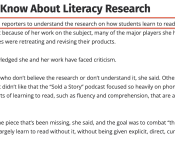Global Ed News
- Columbia University Senate Is Said to Be Redrafting Resolution Admonishing Its President
 Worried that a censure vote could result in President Nemat Shafik’s removal at a time of crisis, the official university body plans to vote on a watered-down proposal, some members said. ... read more19 hours ago
Worried that a censure vote could result in President Nemat Shafik’s removal at a time of crisis, the official university body plans to vote on a watered-down proposal, some members said. ... read more19 hours ago - Saskatchewan schools added to Mental Health Capacity Building program
 Five Saskatchewan schools from Moose Jaw, Lloydminster, Meadow Lake, Yorkton and Regina have been added to the Mental Health Capacity Building (MHCB) in Schools program. ... read more21 hours ago
Five Saskatchewan schools from Moose Jaw, Lloydminster, Meadow Lake, Yorkton and Regina have been added to the Mental Health Capacity Building (MHCB) in Schools program. ... read more21 hours ago - ‘Shock and disbelief’ after Manitoba school trustee’s Indigenous comments
 A controversial presentation by a school trustee in western Manitoba has members of nearby communities in disbelief. ... read more23 hours ago
A controversial presentation by a school trustee in western Manitoba has members of nearby communities in disbelief. ... read more23 hours ago - Curmudgucation: Heritage Foundation Versus Immigrant ChildrenCurmudgucation: Heritage Foundation Versus Immigrant Children The Heritage Foundation is the outfit behind all manner of far-right baloney. These days they're most notable for dropping big bucks to create Project 2025, the right wing Cliff's Notes for the next Trump Presidency (including dismantling education). In February, Heritage released a brief (with fewer dollars and a smaller audience, we'd just call it a blog post) arguing that undocumented immigrant children should be charged tuition to attend US public schools. It comes, of course, with a large helping of Joe Biden Let All The Illegals In, a disingenuous baloney argument. Immigration has been a problem for a few decades now, and no administration has addressed it with anything resembling success. So every four years or so we get sudden squawking from folks on the right, from the xenophobic racist rants of Trump to the old "Well, if they would just come in legally" argument. New rule: you can only use that If Only argument if you can describe what that actually involves. Also, you can only add "like my ancestors" if you know what your ancestors did to enter "legally" (spoiler alert: it was probably "show up"). Plyler v. Doe was the SCOTUS decision that in ... read more1 day ago
- Deal reached to keep Rosemount Center open in Mount PleasantRosemount Center, a bilingual preschool and day care, will remain open at its Mount Pleasant location for two more years, the school and its landlord announced. ... read more1 day ago
- Advice for Teachers, Policymakers, and Donors
 Well over a decade ago, Larry Ferlazzo, a Sacramento (CA) high school English/social studies teacher and avid blogger, interviewed me asking what advice I have for teachers, policymakers, and philanthropists. The advice I offered then came largely from my 14 years as a high school history teacher in Cleveland (OH) and Washington, D.C. public schools, seven years I spent as a district superintendent in Arlington (VA), 20 years of teaching, research, and writing at Stanford University. Since 2001, I have been an emeritus professor teaching occasional university seminars (until 2013) while becoming a full-time writer and blogger. I have updated and expanded that earlier post. The advice I gave then to Larry Ferlazzo is, in my opinion, still apt for teachers, policymakers, and donors in 2024. Larry Ferlazzo: If you were going to offer teachers three key pieces of advice that you think might help them to stay in the profession longer and be more effective educators, what would they be? 1. Re-pot yourself every few years. Teaching is both energizing and exhausting work. When teaching you spend the rich intellectual, physical, and emotional capital that you have accumulated over the years on your students. And because teaching over time is ... read more1 day ago
Well over a decade ago, Larry Ferlazzo, a Sacramento (CA) high school English/social studies teacher and avid blogger, interviewed me asking what advice I have for teachers, policymakers, and philanthropists. The advice I offered then came largely from my 14 years as a high school history teacher in Cleveland (OH) and Washington, D.C. public schools, seven years I spent as a district superintendent in Arlington (VA), 20 years of teaching, research, and writing at Stanford University. Since 2001, I have been an emeritus professor teaching occasional university seminars (until 2013) while becoming a full-time writer and blogger. I have updated and expanded that earlier post. The advice I gave then to Larry Ferlazzo is, in my opinion, still apt for teachers, policymakers, and donors in 2024. Larry Ferlazzo: If you were going to offer teachers three key pieces of advice that you think might help them to stay in the profession longer and be more effective educators, what would they be? 1. Re-pot yourself every few years. Teaching is both energizing and exhausting work. When teaching you spend the rich intellectual, physical, and emotional capital that you have accumulated over the years on your students. And because teaching over time is ... read more1 day ago - Carey Wright will continue to lead Maryland schools, state board announcesCarey Wright, a former Mississippi schools chief, was named the next Maryland state superintendent of schools. She will serve a four-year term starting July 1. ... read more2 days ago
- Jury rejects claims that Fairfax schools mishandled teen’s rape claimsA federal jury in Virginia rejected a lawsuit claiming that the Fairfax County school system mishandled rape allegations by a student more than a decade ago. ... read more2 days ago
- Larry Cuban on School Reform and Classroom Practice: Do Screens Help Kids Learn? (Jessica Grose) (Guest Post by Jessica Grose)Larry Cuban on School Reform and Classroom Practice: Do Screens Help Kids Learn? (Jessica Grose) (Guest Post by Jessica Grose) “Jessica Grose is an Opinion writer for The New York Times, covering family, religion, education, culture and the way we live now.” This piece appeared March, 31, 2024 A few weeks ago, a parent who lives in Texas asked me how much my kids were using screens to do schoolwork in their classrooms. She wasn’t talking about personal devices. (Smartwatches and smartphones are banned in my children’s schools during the school day, which I’m very happy about; I find any argument for allowing these devices in the classroom to be risible.) No, this parent was talking about screens that are school sanctioned, like iPads and Chromebooks issued to children individually for educational activities. I’m embarrassed to say that I couldn’t answer her question because I had never asked or even thought about asking. Partly because the Covid-19 era made screens imperative in an instant — as one ed-tech executive told my colleague Natasha Singer in 2021, the pandemic “sped the adoption of technology in education by easily five to 10 years.” In the early Covid years, when my older daughter started using a ... read more2 days ago
- On the Inertia of Education Systems and Hope for the Future: A Conversation with Jón Torfi Jónasson on Educational Change in Iceland (Part 1)
 “Why don’t schools change?” In this two-part interview, Jón Torfi Jónasson reflects on his work studying educational change in Iceland and other parts of the world. Part 1 explores some of the institutional factors that make it difficult to make … Continue reading ... read more2 days ago
“Why don’t schools change?” In this two-part interview, Jón Torfi Jónasson reflects on his work studying educational change in Iceland and other parts of the world. Part 1 explores some of the institutional factors that make it difficult to make … Continue reading ... read more2 days ago - Janresseger: Public Education Budgets at State and Federal Levels Leave K-12 Public Schools in Hard TimesJanresseger: Public Education Budgets at State and Federal Levels Leave K-12 Public Schools in Hard Times I suspect you have not seen a lot of details about the budget for the U.S. Department of Education, part of the remaining FY 2024 federal budget that had to be passed by Congress over the weekend and signed by President Biden in time to avoid a government shutdown. The only report I’ve seen with any detail came from K-12 Dive’s Kara Arundel on Friday after a budget agreement had been reached but before it was passed by both houses of Congress: “The U.S. Department of Education would get $500 million less for fiscal year 2024 compared to the previous year—the agency’s first potential cut since FY 2015… The tentative agreement comes more than six months after the Oct. 1 deadline to finalize Education Department and several other agencies’ annual appropriations. A series of continuing resolutions has shielded the federal agencies from a government shutdown in the meantime… Under the proposal, Title I and state grants for special education services—two of the largest K-12 federal funding programs—would each get a $20 million increase over FY 2023 allocations. While a bump of $20 million for both does not seem ... read more3 days ago
- Radical Eyes for Equity: Education Journalism and Education Reform as Industry
 Radical Eyes for Equity: Education Journalism and Education Reform as Industry Regardless of your level of optimism, there simply is no other conclusion to draw from over forty years of educational crisis and reform: Education reform has almost nothing to do with improving education for students, but education reform has become an industry. And one of the most powerful engines driving the crisis/reform industry in education is education journalism. Education journalists only write two kinds of stories about education: Education as failure (Crisis!), and education miracles. Interesting is that both are provable false narratives. Yet, these stories endure because “[v]iewing education as being in more or less permanent crisis” (Edling, 2015) creates market and political profit for media, private education corporations, and politicians. As a simple fact of logic, consider that for at least the last century, on every standardized test in every content area, students in poverty as a group have scored significantly lower than more affluent students. Over that century, the teachers, instructional practices, programs, and curriculums/standards have changed dozens of times and have never been coherent at any one point across the US. The only constant, of course, has been the economic inequity of the populations of students being ... read more4 days ago
Radical Eyes for Equity: Education Journalism and Education Reform as Industry Regardless of your level of optimism, there simply is no other conclusion to draw from over forty years of educational crisis and reform: Education reform has almost nothing to do with improving education for students, but education reform has become an industry. And one of the most powerful engines driving the crisis/reform industry in education is education journalism. Education journalists only write two kinds of stories about education: Education as failure (Crisis!), and education miracles. Interesting is that both are provable false narratives. Yet, these stories endure because “[v]iewing education as being in more or less permanent crisis” (Edling, 2015) creates market and political profit for media, private education corporations, and politicians. As a simple fact of logic, consider that for at least the last century, on every standardized test in every content area, students in poverty as a group have scored significantly lower than more affluent students. Over that century, the teachers, instructional practices, programs, and curriculums/standards have changed dozens of times and have never been coherent at any one point across the US. The only constant, of course, has been the economic inequity of the populations of students being ... read more4 days ago - More Cartoons on Tests in School
 I scour the web for new cartoons about teaching, curriculum, administrators, teachers, and, yes, the inescapable practice of students taking tests. Here is this month’s collection of cartoons on what many students (and teachers) dread–taking tests. Enjoy! ... read more4 days ago
I scour the web for new cartoons about teaching, curriculum, administrators, teachers, and, yes, the inescapable practice of students taking tests. Here is this month’s collection of cartoons on what many students (and teachers) dread–taking tests. Enjoy! ... read more4 days ago - Teaching Is a Grind Peppered with Joyful Moments (Bill Ferriter)
 This post appeared in Bill Ferriter’s blog, “The Tempered Radical.” In his blog, he describes himself as follows: “Bill Ferriter has about a dozen titles—Solution Tree author and professional development associate, noted edublogger, senior fellow of the Teacher Leaders Network—but he checks them all at the door each morning when he walks into his sixth- grade classroom in Raleigh, North Carolina.” After 29 years in North Carolina public school classrooms, Ferriter retired and now consults with schools and districts. Teaching is a Grind. I’m sitting in a dirty McDonald’s restaurant right now. It’s the same dirty McDonald’s restaurant that I’ve spent the better part of the past 15 years sitting in. Stop by and you are almost guaranteed to find me in a booth near the back — next to the filthy bathrooms and just inside the door where the sketchy teens are chain-smoking Marlboro Reds. I come here after school and on the weekends to crank out writing for part time projects. Sometimes I’m blogging. Sometimes I’m putting together #edtech or #ccss lessons that I’ll use in my classroom AND in professional development workshops that I deliver during those legendary “vacations” that teachers get. Sometimes I’m answering emails sent by school ... read more1 week ago
This post appeared in Bill Ferriter’s blog, “The Tempered Radical.” In his blog, he describes himself as follows: “Bill Ferriter has about a dozen titles—Solution Tree author and professional development associate, noted edublogger, senior fellow of the Teacher Leaders Network—but he checks them all at the door each morning when he walks into his sixth- grade classroom in Raleigh, North Carolina.” After 29 years in North Carolina public school classrooms, Ferriter retired and now consults with schools and districts. Teaching is a Grind. I’m sitting in a dirty McDonald’s restaurant right now. It’s the same dirty McDonald’s restaurant that I’ve spent the better part of the past 15 years sitting in. Stop by and you are almost guaranteed to find me in a booth near the back — next to the filthy bathrooms and just inside the door where the sketchy teens are chain-smoking Marlboro Reds. I come here after school and on the weekends to crank out writing for part time projects. Sometimes I’m blogging. Sometimes I’m putting together #edtech or #ccss lessons that I’ll use in my classroom AND in professional development workshops that I deliver during those legendary “vacations” that teachers get. Sometimes I’m answering emails sent by school ... read more1 week ago - Fostering Research Practice Partnerships for Leadership Equity: Lead the Change Interviews (Part 9)
 This week, IEN features the work of scholars focused on research practice partnerships and racial justice in educational leadership. This is the ninth and final post in a series featuring excerpts of interviews with presenters participating in the Educational Change Special … Continue reading ... read more1 week ago
This week, IEN features the work of scholars focused on research practice partnerships and racial justice in educational leadership. This is the ninth and final post in a series featuring excerpts of interviews with presenters participating in the Educational Change Special … Continue reading ... read more1 week ago

Recent Comments